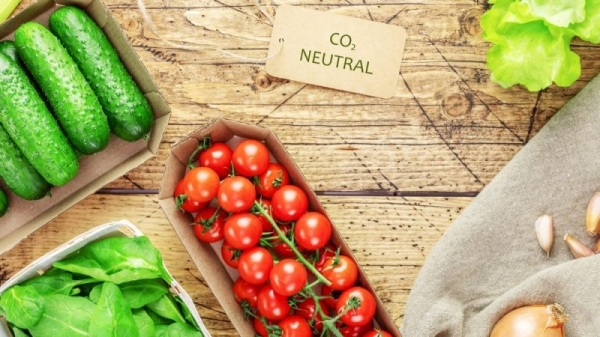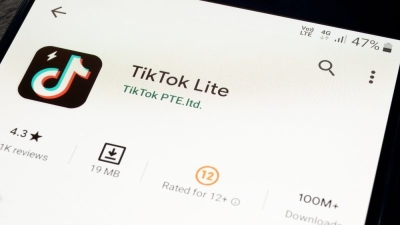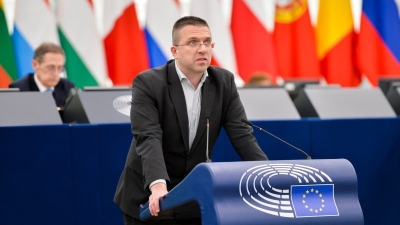‘Carbon neutral’ food claims challenged under new Commission rules

Food companies will be forced to justify claims like carbon neutral under newly proposed rules from the European Commission as criticisms mount over the ‘rampant’ greenwashing found on supermarket shelves – but farmers warn plans must be fine-tuned for the specificities of the food sector.
The European Commission presented its proposal for the green claims initiative on Wednesday (22 March), which aims to help consumers make better-informed choices about the products they buy.
“More than half of the claims we see in the European market are vague, misleading or even based on nothing at all,” Environment Commissioner Virginijus Sinkevičius said at a press conference marking the presentation of the proposal.
The problem is particularly prevalent in the agri-food sector, where terms such as ‘carbon neutral’, ‘CO2 neutral’ and ‘carbon positive’ on food products have become commonplace on EU supermarket shelves.
But for green groups, these claims amount to little more than ‘rampant greenwashing’ by the food industry.
Nusa Urbancic, campaign director of Changing Markets Foundation, cited a recent analysis by his association which explored green claims made by major food and drinks giants such as Nestlé, Arla, and Danish Crown or big retailers such as Lidl, reserving particular criticism for the greenwashing by the meat and dairy industry.
“Greenwashing is rampant across the meat and dairy sector,” she said, stating it “provides a veneer of sustainability for an industry that is responsible for a third of global methane emissions and is the main driver of biodiversity loss”.
According to a recently published YouGov polling, these claims significantly impact consumer choices.
The poll found that almost half (49%) of adults in the UK and Germany regularly buy products with sustainability labels or certification, while nearly a third (29%) are willing to pay more for products labelled carbon neutral, climate positive or low methane.

Green(claims)washing: Ban climate-neutral food labels, says consumer group
Carbon neutral claims are misleading and confuse consumers, according to a new report from consumer group BEUC who call for the terms to be banned from food and drink products in the EU.
What changes?
Regarding the agrifood sector, the proposal can be considered the first attempt to harmonise rules in green claims on products.
As per the Commission proposal, companies must independently verify green claims and prove them with scientific evidence before communicating them.
Offending companies will be subject to penalties ranging from fines to confiscation of revenues and temporary exclusion from public procurement processes and public funding.
Meanwhile, new public schemes will not be allowed unless developed at the EU level, and new private schemes are only permitted if they can show higher environmental ambition than existing ones.
“Taken together, these actions should prevent misleading claims from reaching consumers,” the Commissioner said, stressing the importance of these claims.
EU farmers’ association COPA-COGECA welcomed the move among the “current proliferation of environmental claims and labels”, noting that false claims significantly impact consumer trust in farmers’ work.
However, they warn that the proposal must be fine-tuned.
In particular, the association called for currently existing national schemes and labels to remain operational.
“This is crucial to safeguard the years, sometimes decades, of investments done by the farming and forestry community in certain environmental schemes and labels that are proven to be reliable, scientifically robust, and integrated in the market,” the association said in a statement, noting that the proposal is ‘still unclear’ in this respect.
Likewise, EuroCommerce, representing EU retailers and wholesalers, welcomed the proposed rules but expressed some reservations.
“Retailers and wholesalers agree that consumers need to be assured that environmental claims are properly verified and that they should, equally, be protected from misleading claims,” Christel Delberghe, director general at EuroCommerce, said, stressing the need for environmental claims to be “transparent and verifiable”.
However, the association raised another concern, suggesting that regulation would have helped achieve greater harmonisation than the proposed directive.
“The association will look for more clarity on how this legislation will be reconciled with pre-existing national and EU labels, already covering green claims,” he said.

EU clamps down on misleading ecolabels with penalties against greenwashing
The European Commission tabled new legislation on Wednesday (22 March) to tackle misleading environmental claims by introducing penalties against greenwashing and tighter rules for the approval of new ecolabels.



